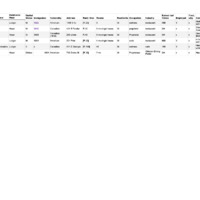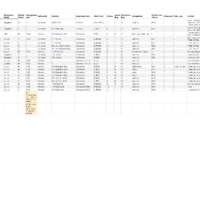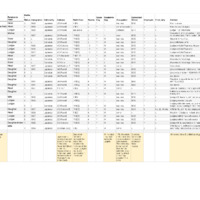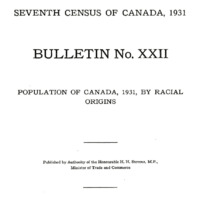Census of Canada 1931 - Restaurant sector data research by gender and race
Item
Descriptive Metadata
- Identifier
- Census 1931-Restaurant Sector, Gender, and Race 1-3
- Title
- Census of Canada 1931 - Restaurant sector data research by gender and race
- Description
-
Census records contain data that are mandated to be reported to enumerators by the head of household, however, there are many exceptions in practice, including the enumerator adding data that may not be accurate.
These notes on searches of the 1931 census using new Ancestry handwriting recognition tools show anonymized results for Vancouver and New Westminster districts for women in the restaurant sector by occupation, work categories, and were identified as Black, Japanese, or Chinese under the "racial origin" category. See the attached "Bulletin No XXII, Population of Canada, 1931, By Racial Origins" for more details on how the 1931 Census represented these. - Format
- PDFs, 4
- Type
- Researcher notes
- Canada Federal Government publication
- Creator
- Researcher, Karen Knights
- Date Created
- 2024
- Date
- 1931
Research, Contributions, Curation
- Sub-theme
- Census records
- Places, Locations and Nations
- Vancouver, Canada
- New Westminster, Canada
- Unceded territories of the xʷməθkwəy̓əm (Musqueam), Skwxwú7mesh (Squamish) and səlilwətaɬ (Tsleil-Waututh) Nations.
- Note
-
Relevant notes from Ancestry.com related to the records:
Thanks to our proprietary handwriting recognition technology, the 1931 Census of Canada records are now searchable. Please keep in mind that diacritical and accent marks may not appear and are not required to search names. Transcription accuracy is dependent upon the quality of the document being scanned. For best results, view the census image.
Conducted during the Great Depression, the 1931 census included questions about unemployment. If applicable, you may also find the following information:
Causes of unemployment
Length of unemployment
Medical history concerning unemployment
Living conditions relating to being unhoused
Held during the height of the Great Depression, the seventh national census differed from previous years by including an expanded section about unemployment. Government officials hoped that the data gathered by the census would help combat economic problems. Interestingly, collecting census data would provide aid for a small segment of the unemployed population. Working as an enumerator paid five cents per person counted, offering temporary income to those hired. Enumerators were thoroughly trained and were required to work until their district was fully counted. Biases and assumptions based on the part of the enumerator may also be present in the records.
Source
- Source
- Ancestry.com
- Resource class
- Document





Interpretive Analysis
No comment yet! Be the first to add one!